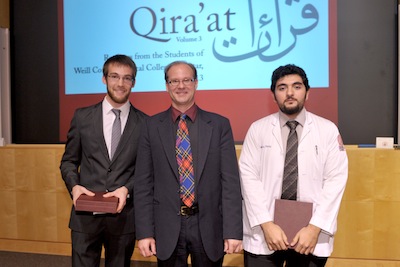Top student essayists unveiled at book launch
March, 2013

Josia Schlögl, Dr. Alan Weber, and Abdelaziz Farhat.
The best essays written by students at WCMC-Q students have been unveiled with the launch of Qira’at, a compendium of literary works published by the university.
The book, published biennially and now in its third volume, was officially presented to the public at a ceremony held at the university that also saw the three best student essayists awarded prizes for the quality of their work.
First place in the Best Essay awards was clinched by third-year medical student Abdelaziz Farhat for his exploration of medical ethics, entitled “The Right to Know: Informing Terminally Ill Patients”. Second prize went to second-year pre-medical student Josia Schlögl for an essay penned as part of a writing seminar on Islamic medicine, entitled “Compatibility of Anthropological Views with Islamic Teachings about the Evil Eye”. Both Josia and Abdelaziz gave presentations at the launch event on Monday 18 March to set their essays in context.
Abdelaziz, whose essay was supervised by Dr. Pablo Rodríguez del Pozo, associate professor of public health, told the audience: “The purpose of my essay was to dispute the idea that there can there can be a justification for withholding the truth from terminally ill patients. I argued that patients must always be told the truth, no matter how difficult the circumstances might be.
“Reasons for withholding the truth generally benefit the physician and not the patient. Avoiding telling a patient the truth may save him or her some pain, but it will also deprive the patient of their autonomy, prevent them from making informed decisions regarding their treatment and deprive them of the opportunity to say goodbye to their family and friends, among other important considerations.”
A total of 43 essays are included in Qira’at, which means ‘Readings’ in English, tackling subjects from healthcare provision in India and the challenges facing brain dead patients, to themes of violence and revenge in Shakespeare.
First-year medical student Risheek Kaul’s Marxist critique of a Hollywood blockbuster, entitled “The Misrepresentation of ‘reality’ in ‘The Kingdom’”, won third place in the contest, which was judged by two Ithaca faculty members, Dr. Katherine Gottschalk, the Walter C. Teagle director of first-year writing seminars, and Dr. Paul Sawyer, director of the Knight Institute for Writing in the Disciplines.
Dr. Gottschalk, visiting from the U.S, addressed the launch event: “When we sat down to select winners, Paul and I were in the happy position of being confronted with a collection of excellent essays,” she said.
“When you read these essays, you will notice how aware the writers are of the need to analyze the complexity of a situation before coming to conclusions; you will notice their awareness of various perspectives. You will find that they critically analyze ‘facts’ to see if they are indeed facts. And you will find that they share a gift for clarity and strength of expression.
“The qualities that we looked for in the essays are, of course, qualities that one hopes to find in a medical practitioner.”
Dr. Gottschalk also paid tribute to the editorial team of Qira’at, which comprised Dr. Alan Weber, Dr. Krystyna Golkowska, Dr. Ian Miller, Dr. Mary Ann Rishel, and Dr. Rodney Sharkey. Lead editor Dr. Weber, assistant professor of English, explained the purpose of Qira’at.
He said: “Qira’at was created because we wanted somewhere to showcase the talents of our students. Qira’at is also very effective from a teaching perspective because we can use it to give students in our writing classes examples of the standard they should be aiming for.
“Through Qira’at, and the process of reflective writing in general, our students learn critical communication skills that will make them better physicians. They also learn to identify and empathize with the experiences of patients, and to appreciate that they must understand the audience they are writing for in order to communicate effectively.
“Because Qira’at offers the possibility of being published, we find that it inspires the students to write and to write well, and I’m very impressed with the standard of the essays.”
